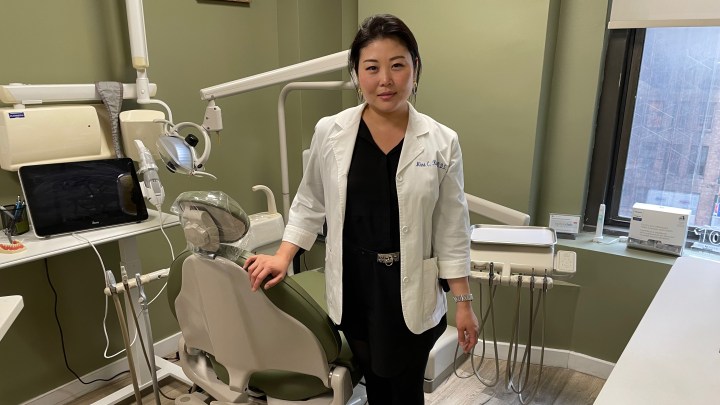
What’s with all the requests for reviews from health care providers?
What’s with all the requests for reviews from health care providers?

We’re all used to businesses asking for reviews. And more and more medical providers are now among those urging us to rate our experiences.
Dr. Mina Kim, the owner of Bryant Park Dental Associates, a dental practice in midtown Manhattan, took over the practice from her dad, who still works there. For most of his working life, word of mouth brought in new patients. As more and more patients search the web for a doctor or dentist, the more they rely on online reviews to help them make decisions.
In the last couple of years, Dr. Kim’s office staff have begun asking patients right after their appointment if they’d leave a review.
“I look at certain analytics,” she said. “And I saw that the most traffic other than word of mouth was either coming through Google or Yelp.”
To rank highly on those sites, you need a bunch of good reviews. Kim, who is also president-elect of the New York County Dental Society, said it’s particularly important for her given how many rivals she has: Manhattan alone has at least 2,000 practicing dentists.
“I can probably throw a rock on the street and hit a dentist if I wanted to,” she said. “This is the thing with reviews: You can be the best dentist in the world with the most beautiful office. If no one knows about it, you’re not going to have any patients.”
She has about 40 Google reviews so far — mostly glowing — but she says fewer than 5% of patients bother to leave one. That figure is typical for healthcare practices because of people like Daniel Fletcher, who lives in Seattle.
“I always think these are not benevolent organizations, these are for-profit companies, so I get frustrated that they think they can intrude on my time,” Fletcher said, by getting him to do their marketing for free.
He said he never leaves reviews, even if he’s asked repeatedly.
Sarah Eggers in Kansas City said she’s happy to help a doctor she has a good relationship with. She’s done that, and once she left a review she didn’t get further reminders.
But she said other providers pursue her with texts and emails that start right after an appointment ends. Take her local urgent care clinic, where she took her 5-year-old daughter on a recent Saturday. She said her phone pinged while she was still getting her daughter into the car.
“After I’d just buckled her in, I get a text being like ‘Hey, do you want to leave us a review?’ I’m like, ‘No, I’m not in the mood to leave you a review, my daughter’s sick and I need to go get her medicine. She has another ear infection,’” Eggers said. She said tone-deaf timing is a turnoff.
Shama Hyder, CEO of marketing company Zen Media, advises healthcare practices to follow up with patients between one and two days — not minutes — after an appointment.
“You don’t want to go so long that a patient has completely moved on with their life and forgotten about their experience,” Hyder said. “Or worse yet, had a rough experience and already decided to share that on a public forum.”
That can then scare off potential patients. She said many medical offices have a system in place to try and deal with a patient’s concerns right away.
“For example,” she said, “you get an email that says, ‘Rate your experience one to five.’ And if it’s anything three or below, they can follow up and they can address it.”
And mollify the patient before they blast the practice on Google or Yelp.
For all the power of reviews, Hyder said word of mouth is still connecting patients with doctors. But that has gone digital as well: Recommendations happen on social media and in private chat groups.
There’s a lot happening in the world. Through it all, Marketplace is here for you.
You rely on Marketplace to break down the world’s events and tell you how it affects you in a fact-based, approachable way. We rely on your financial support to keep making that possible.
Your donation today powers the independent journalism that you rely on. For just $5/month, you can help sustain Marketplace so we can keep reporting on the things that matter to you.











